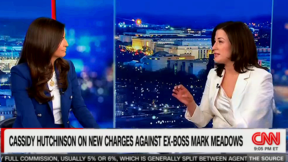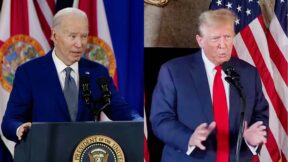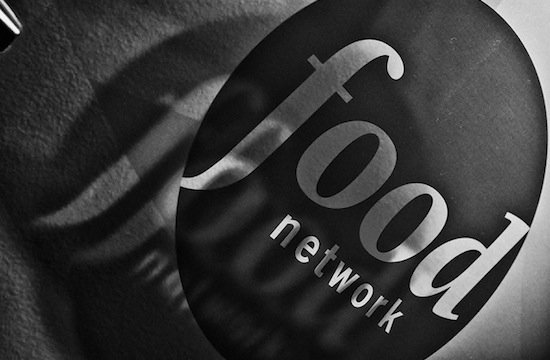Allen Salkin on FN’s Culture Crisis: ‘The Network Itself Doesn’t Know What A Food Network Star Is Anymore’
Earlier this fall, NYU professor Allen Salkin published From Scratch: Inside the Food Network, a surprising book about the palace intrigue inside the seemingly benign Food Network: chef betrayals, Paula Deen downfalls, and, best of all, Guy Fieri’s billionaire friends. As the year winds down and the 20-year-old network reels from a year of scandals, we sat down with Salkin to talk about the future of food programming.
Food Network has always been this quirky little outsider in American culture, so why dedicate your attention to its growth?
Well, we’ve been riding this amazing food wave — I guess you could call it a tsunami — for twenty years, and I don’t think that the Food Network is a small cultural backwater. Go to the gym. What’s on? ESPN and the Food Network. It’s this amazing common denominator everybody can agree on. Almost everybody in America knows these names of the Food Network stars.
As a journalist, writing about what really is a massive cultural force that hasn’t been fully explored is incredibly tantalizing.
Why do you think it hasn’t been explored until now?
It’s the same reason why all the bookstores are putting my book in the cookbook section. Everybody’s first question when they see the cover is, “Are you a chef?” and “Are there recipes in it?” There’s this prejudice, in a way — still — about food as a serious subject, and food media even more so. I’m sure the guys who started Rolling Stone dealt with the same questions. Why devote an entire publication to that hippie music?
“Why devote an entire publication to music at all? Don’t you just listen to it? Isn’t it just pleasant?”
Right. Food has so many meanings to so many people, and the major outlet that has given us so much food information for over two decades is certainly worth examining, if you’re interested in American culture at all, and in media. To me, the book actually belongs in the business section, not in the cookbook section. It belongs with the great American business success stories. That kind of book is really what it is.
Was it interesting for you to watch these already successful chefs enter an incredibly ruthless television world? The Emeril chapter comes to mind. Did you find that chefs have a different reaction to these very ruthless power plays?
Yes, because chefs are used to being the king of their restaurants, and being a television star requires different skills, which is why someone like Bobby Flay is so unique, because he’s both a top-notch restaurateur, and great at the politics of television. That’s rare. If you look at Emeril [Lagasse], he still thought he was the greatest chef and a great performer, and if crowds were still turning up for him, he should still have a television show. He and his agent did not play the internal games of network politics properly. The reason I gave in the book is that over time, it became more of a cold, calculating television enterprise, and less of a food operation.
“Food Entertainment” versus “Stir-And-Dump.” I think that’s what you called it?
That’s true. But not just that — in the early days, being good on camera and being a great chef was all that you needed.
I’ve seen all these Food Network stars come and go, and some of them manage to secure themselves a good career, and some of them don’t. What have you found differentiates the successes and the has-been brands? Justin Warner comes to mind: from the perspective of a Millennial, he’s awesome, but he’s never been able to grab traction on the Food Network.
I think it’s a failure of the Food Network’s imagination that they haven’t figured out a way to get a successful show behind Justin. It does not say good things about them. Also, the premise of that season is that Alton Brown would produce a show with Justin and these two great minds would come together. And then what happens? Alton Brown did not produce a show. The fans know that. That lack of consistency is ugly.
Is that the network’s fault alone?
Yes! As far as I know, Alton was willing to do it. Ask yourself, did the Food Network commit the budget that would have been required? Alton’s show, Good Eats, was not a cheap show. They spent almost the entire budget that the Food Network gave them on producing that show. Alton makes far more money as a host of Iron Chef America than he ever did from Good Eats. It’s quite possible that Alton said, “Okay, this is how much it will cost to make Justin’s show,” and the Food Network said, “We’re not spending that.” I don’t know that, just so you know, but it strikes me as very likely, because Alton doesn’t want to air that laundry publicly. Alton is a very controlling and brilliant character. A brilliant person. But knowing him, if they didn’t want to do it his way, he didn’t want to do it.
So it’s a failure of the Food Network. Absolutely. They promised something on that reality show. They did not deliver. Fans know it. We saw that one-off special, and we’re like, “How are we supposed to judge on that?”
At least all the other winners got some bum slot on a 9 AM on a Saturday.
That’s like the time they made a big deal about producing a hunger documentary, and they ran it late on a Saturday night, when nobody’s watching food programming. Then they could say, “Well, the hunger documentary didn’t get any ratings.” Why don’t you put it on at 8 o’clock on a weeknight? I can’t tell you how ugly that whole Justin Warner thing is. It’s just wrong.
It’s pretty clear what it took to become a star back in the day when the Food Network was still growing, but what does it take these days?
The problem is, the network itself doesn’t know what a Food Network star is anymore.
Oh, really?! They have an entire show based on that premise!
Who was the last Food Network Star to become a breakthrough household name?
Guy Fieri.
Right, and that was seven years ago. The Food Network itself as it approaches its 20th Anniversary is in a crisis. Its ratings are going down, and the winners of Food Network Star look like they’d be the perfect new star for 2003. The woman who won this year, Damaris Phillips, is a sweet and charming talent who I wish the best for, but was really not the best television personality on that show. The best personality was Danushka, who was tossed early. Danushka was the Snooki of that show. She was difficult and weird and demanding and petulant, and you couldn’t take your eyes off her. She is someone that they could have — and should have — figured out a way to stay in business with. But instead, they had this sweet girl do a show about cooking for your man. It’s regressive.
The popular YouTube shows about food happen to be the anti-Food Network, like Epic Meal Time.
Food Network is hoping that the next Duck Dynasty walks into the door, and that somebody pitches them a way to solve their problem, to figure out “What is the new food show?” The company, while it’s based in New York, has these corporate overlords in Knoxville, TN — a Midwestern, Southern, conservative place. It’s somehow looking to have the edgy programming that appeals to the masses, while somehow staying safe enough to advertise toothpaste on.
So what do you think the future of Food Network is going to be?
At its best, Food Network provided a warm, comforting place of refuge. We turn to ESPN and the Food Network because that’s what we like when we’re in pain. That’s something that appeals to our archetypes, to our oldest selves: watching somebody in front of a fire, making something delicious for us. As the media landscape becomes more on demand, if the Food Network wants to keep a place in our hearts, it’s going to have to deliver the warm, fuzzy programming we fell in love with at the start…I do hope they find some new way to delight us like they did at their peak.
Have a tip we should know? tips@mediaite.com







